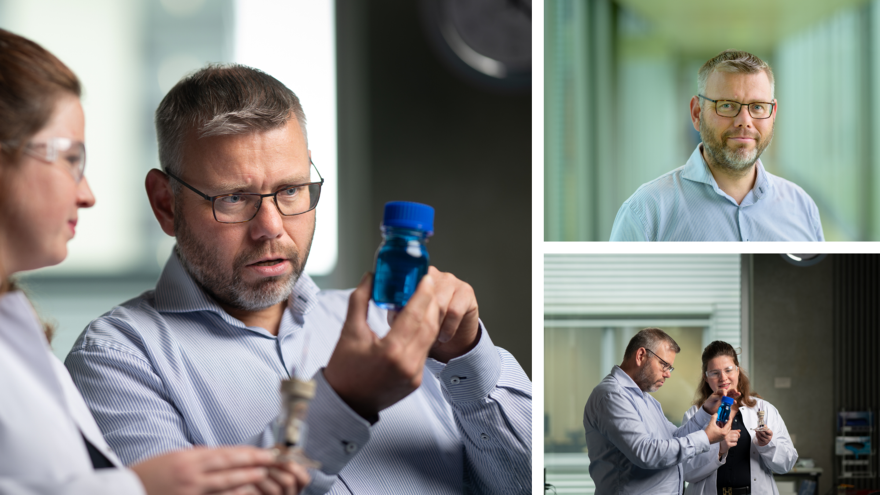Sustainable separation technologies can make our industries cleaner
“I want to convert the current linear economy to a circular economy”
As an expert in the field of sustainable separation engineering, Boelo Schuur aims to make our industries cleaner. “Separation technologies account for 50% of all costs in industry, come with correspondingly large emissions and use a lot of energy. My task is to make the processes as sustainable as possible and help us move towards circular economy.”
Boelo Schuur is a Professor of Separation Technology in the cluster Process & Catalysis Engineering at the University of Twente. His research focuses on sustainable separation technologies, which cover recycling of chemicals and development of new, more sustainable separation processes for chemical operations.
“If you picture a chemical factory, you picture tall towers. The tallest towers are separation units,” describes Schuur. “Separation is done in many different stages and the more stages, the higher the tower. This process, however, isn’t always the most efficient.” This is particularly true for biobased chemicals, the focus of Schuur’s work. “Biomass comes with an extra level of complexity. Chemical factories are big and centralized. Biomass has a huge volume, though, and so using one centralized facility is not necessarily a good option. The upscaled old-school approach doesn’t always work for biomass, which is why I work on scaling down and creating smaller operations. This would make the use of biomass more efficient and more feasible.”
Boelo Schuur works with many different separation techniques and a variety of industries because, as he says, there are similar challenges in all of them. “The way you mix and separate compounds is essentially the same whether you run a bakery or a chemical plant,” says the professor. “I have worked in the paper industry, pharmaceuticals, biochemicals and many more. I have even worked on removing protein stains from Rembrandt paintings. The paintings needed to be cleaned and separation technologies can help with this, because the underlying separation mechanisms are still the same. My task is to read the structure of the molecule and how it could be carried out of the mixture.”
One of Schuur’s main research interests has been wastewater separation. More specifically, the recovery of volatile fatty acids from fermented wastewater. “I see a lot of promise in this area,” he says. “I’ve been working on methods to get valuable chemicals, such as volatile acids, out of wastewater because these acids can be used for a number of products, such as glue or paint, but they can also be used for conversion into compounds that we currently get from oil-based materials.”
Overall, the UT scientist’s work contributes to making circular economy possible. “However, recycling should not be more expensive than starting from scratch, but recycling is currently more energy intensive than producing a brand-new product,” he explains. To this end, an enormous amount of separation technologies needs to be developed. “Just take the example of plastics. Plastic is a mixture. To recycle it, you need to separate it into individual polymers. It’s like playing with Lego. Deconstructing materials is like taking apart a structure to get the individual Lego bricks and using these to build something new.”
In the long run, Boelo Schuur’s goal is clear: making a significant contribution to separation technologies. “I want us to be able to recycle 70% of all chemicals and materials and have the remaining 30% made of biomass,” he says. “I want to convert the current linear economy to a circular economy based on biological sources.”
Education
Also in teaching, Boelo Schuur is involved in sustainability. He teaches BSc courses on Industrial Chemistry & Processes, and Project Sustainable Industrial Chemistry, as well as the MSc course Advanced Molecular Separations. “I teach our students what the current chemical industry looks like – and how we could feed it circular instead of feeding it with oil,” he says. For instance, he shows students how the factory works and lets them evaluate the sustainability of a specific product. “They compare different methods of production and compare the sustainability and life cycle of the product following each method. I want to teach them to make a proper comparison between renewable fuel and fossil fuel, for example.”
Bringing practice directly into the classroom is a key aspect of education, stresses Schuur. “We use a lot of industrial case studies because I want the students to work on real problems in industry. In return, the students are usually very enthusiastic about this approach, because they can directly help a company. I want to prepare our engineers for the energy transition and equip them with the actual techniques that are needed for the transition toward cleaner technologies.”
About Boelo Schuur
Boelo Schuur is Professor of Separation Technology in the Department of Chemical Engineering, Faculty of Science & Technology (TNW) of the University of Twente. He obtained his PhD degree in Chemical Engineering at the University of Groningen (2008) with his thesis titled “Enantioselective liquid-liquid extraction in centrifugal contactor separators.” On top of his position at the UT, Schuur is the scientific vice-president of the European Federation of Chemical Engineering (EFCE) and programme director Separations for Circularity at the Institute for Sustainable Process Technology (ISPT).
PRESS PHOTOS
These press photos can be used, please include the name of the photographer, Fokke Eenhoorn.

